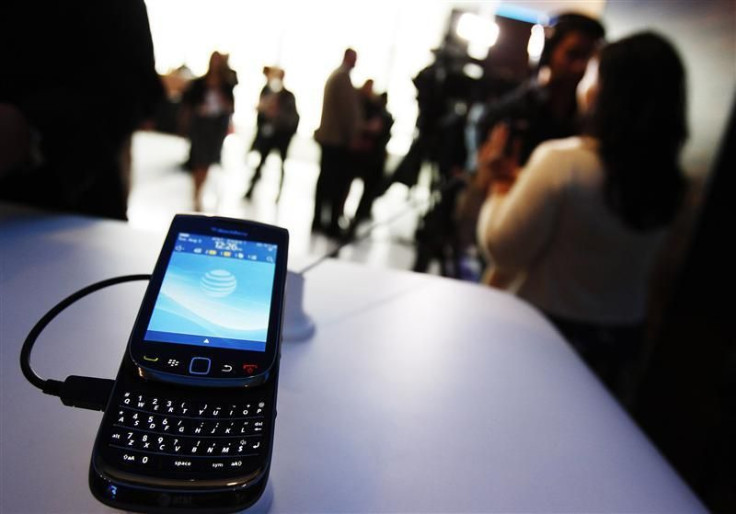Americans Losing Addiction to 'CrackBerrys'

(Reuters) - To understand what ails BlackBerry maker Research In Motion Ltd in the U.S. market, just ask eBay Inc Chief Executive John Donahoe.
The world's biggest online auction site had about a hundred engineers developing new iterations of eBay's shopping app for Apple Inc's iPhone a few months ago, and another hundred engineers working on Google Inc's Android mobile platform.
EBay even had 50 people developing apps for Microsoft's Windows phones, but the e-commerce giant only had one or two working on RIM's BlackBerry, according to Donahoe.
I still use the BlackBerry, but it's not the most developer-friendly platform, he told a group of chief technology officers at an event at Stanford University in June, when the subject of RIM came up.
By early November, it seemed Donahoe wasn't even using his BlackBerry much any more. When he met with reporters to talk about plans for the holiday shopping season, the CEO whipped out his iPhone to show how eBay's apps ran on the device. When Reuters asked Donahue about his BlackBerry, he said he still had it but didn't bother to bring it into the room.
Such stories are commonly found among RIM's once-loyal corporate and consumer customers, who are deserting the Canadian company after it has struggled to keep up with competitors' innovations.
RIM on Thursday posted a sharply lower quarterly profit, offered a dismal forecast for BlackBerry shipments this holiday season, and delayed the arrival of new phones using a make-or-break operating system in development, QNX.
It's frustrating because I haven't heard anything good from them in a long time, said long-time BlackBerry user Kevin Nichols, the head of KLN Consulting Group, who was looking at Android and Windows phones at a Sprint Nextel Corp store in downtown San Francisco on Friday.
They need to come out with new products soon, otherwise it looks like RIM may become the next Palm, he said, in reference to the collapse of the smartphone pioneer Palm Inc. Nichols ignored the latest BlackBerry Torch in a display case nearby, saying the device wasn't new enough for him to upgrade.
Even on Wall Street, where users once joked about their addiction to their crackberries, loyalty is waning.
The QNX delay is a concern, said Rob Romero, head of hedge fund firm Connective Capital. Consumers like new products and vendors want something new to sell in their stores.
The chief technology officer of a Connecticut-based hedge fund said that when a top hedge fund manager wants to use an iPhone instead of a BlackBerry they can now switch, even though he prefers RIM security. When they say I want an iPhone or an iPad configured, they get it, said the CTO, who declined to be identified.
RIM shares fell 11 percent on Nasdaq on Friday and hit their lowest level in nearly eight years.
SECURITY FEATURES
Research firm Strategy Analytics forecast RIM's share of the U.S. smartphone market to fall to 12 percent this year, a sharp drop from 2007, when RIM had a 44 percent share. By comparison, Apple, which just started selling smartphones in 2007, is expected to grab a 24 percent U.S. market share this year.
To be sure, BlackBerry still has its defenders. Robert Laikin, CEO of cellphone distributor Brightpoint, said that RIM represents between 5 percent to 10 percent of the 110 million phones his company handles globally every year.
I still have a BlackBerry. When I talk to my friends who are business professionals, most of them still have a BlackBerry. Some of them have bought an additional device too, he told Reuters.
All manufacturers I've worked with in the last 25 years have product delays. What RIM is going through isn't different, he said. I believe RIM will survive because their product is very sticky.
There are still many companies who prefer their employees use BlackBerrys because they feel that RIM offers the best security features to protect corporate data. But these enterprise customers are shrinking, analysts said.
Gary Curtis, chief technology strategist at global technology consulting giant Accenture, pointed to improvements in security from Apple and Google mobile software in recent years.
Choice and leveling of the playing field is the fundamental enabling factor for companies being able to say to employees, use the device you like, he said. It's not a headlong rush ... but they're opening the door to more devices and people make their own choices.
Interviews with other consumers at phone stores on Friday illustrated why the former bastion of corporate smart phones faces tough competition.
I'm a BlackBerry user but my company makes me use it, said a shopper called John who was playing with a BlackBerry Torch at an AT&T store in San Francisco. He declined to give his last name.
Anyone who is anyone at my company has an iPhone, but they make us use BlackBerry still, he added. I think I might break mine and buy an iPhone. The touch screen on this Torch works pretty well, but the iPhone is just easier to use.
A Sprint store manager said BlackBerry phones would sell better if they had more apps. But some app developers aren't interested in the BlackBerry platform, partly because the technology is difficult to work with.
Of the companies that pitch to us, I can't think of any that are starting out by developing an app for the BlackBerry, said Theresia Gouw Ranzetta of venture capital firm Accel Partners, which invests in mobile app developers.
Hotel Tonight, a start-up backed by Accel's Ranzetta, has developed apps for the iPhone, Android phones and an HTML5 version for its last-minute hotel booking service.
Will they make a dedicated BlackBerry app? Not on the roadmap, she said.
© Copyright Thomson Reuters 2024. All rights reserved.




















